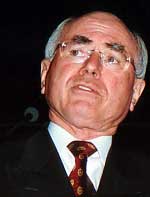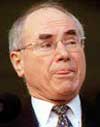| [Images
added by this website] 
Monday June 16 2003  Spinning
out of control Spinning
out of control
Australians
are a politically disengaged bunch,
writes David Fickling, but their
government's deception over the war in
Iraq may yet jolt them out of their
apathy David
Fickling CERTAIN aspects of
character are assumed to be more or less
the same the world over: fear of failure,
hope for the future, hatred of injustice.
You might have thought that the response
to dishonesty would be similarly
universal, but if public reaction around
the globe to the lying and spin used to
promote war in Iraq are anything to go by,
it is anything but.  In
the US, news that Washington ignored the
testimony of its own intelligence agencies
has been greeted by the plunging of heads
into sand. For conservatives and much of
the US mainstream, such matters are best
not thought about. The four-square
solidarity behind the White House
following the September 11, 2001 terrorist
attacks will admit no imperfection on the
part of government. In
the US, news that Washington ignored the
testimony of its own intelligence agencies
has been greeted by the plunging of heads
into sand. For conservatives and much of
the US mainstream, such matters are best
not thought about. The four-square
solidarity behind the White House
following the September 11, 2001 terrorist
attacks will admit no imperfection on the
part of government.
Britain sees things differently. As any
pom resident in Australia soon learns,
Brits have an international reputation for
whinging about things, and the Iraq war
has consequently spawned ministerial
resignations, blanket news coverage, and a
select committee inquiry. If national stereotypes are anything to
go by, Australians might be expected to
concentrate on their desire for good
times, rather than worry about what's
going on in Canberra. And true to form,
public reaction from third member of the
coalition of the willing has largely been
one of ennui. This is strange, given the strength of
the case against the government here. In
Britain, journalists, politicians and
activists have spent weeks trying to dig
up evidence that the government made up
its intelligence claims relating to Iraq.
In Australia, that evidence was on the
front page of the country's biggest news
weekly a full two weeks before the first
cruise missile was launched on
Baghdad. The revelation
came with the resignation of Andrew
Wilkie, a senior analyst at
Australia's top intelligence body, the
Office of National Assessment (ONA). A
former soldier with an open, affable
manner, Wilkie used to sit in his
Canberra office reading raw
intelligence reports from Australian
and international spy agencies,
weighing them up and then boiling them
down into briefings for the prime
minister and cabinet. His military background meant he was
given a particularly wide-ranging role in
the run-up to the Iraq war, though the
government has done its best to downplay
his importance among ONA's staff of
30.  Wilkie
does not mince his words. Claims of
collaboration between Saddam
Hussein's regime and Al Qaeda were
"preposterous". "They were clearly
concocted. There was no strong
intelligence to support it whatsoever," he
says. Wilkie
does not mince his words. Claims of
collaboration between Saddam
Hussein's regime and Al Qaeda were
"preposterous". "They were clearly
concocted. There was no strong
intelligence to support it whatsoever," he
says.
Evidence about that missing stockpile
of weapons of mass destruction was
similarly unreliable. "It was clear before
the war that some of the evidence on WMD
coming out of Britain and America was
garbage," he says. "It was being skewed by
political information from Iraqis who were
trying to encourage a US invasion." Only half-jokingly, he talks about
sitting at his desk and rapidly directing
Pentagon-originated intelligence reports
to the ONA rubbish bin. Wilkie was initially stunned by the
level of interest his resignation
generated. With typical journalistic
understatement, the columnist who broke
the story forewarned him that he could
expect a few days of calls from the media.
In fact, he says that fielding press
queries has been a full-time job in the
three months since he left. This week he is in London, where the
foreign affairs select committee will
question him further about the subterfuge
used to sell the war. His testimony is
likely to be explosive. Governments in
Washington, London and Canberra, he will
say, were simply lying to the public about
Iraq. The intelligence reports Wilkie passed
to the Australian cabinet did not begin to
justify the unequivocal claims made by
politicians, including prime minister
John Howard (right), about
Iraq's "massive" WMD programme.  Furthermore,
assessments of the British and American
governments made by Australian diplomatic
staff and defence attaches showed a
similar gulf between claimed and genuine
motives. Furthermore,
assessments of the British and American
governments made by Australian diplomatic
staff and defence attaches showed a
similar gulf between claimed and genuine
motives.
"I know for a fact that in Australia,
the government was being well advised that
WMD was not the sole reason for Washington
going to war," he says. "In fact, it
wasn't even the most important reason ...
The British and Australian governments
were well aware of the real reasons for
the war." That the Australian government was
aware of this, but kept it from the public
while sending Australian troops off to
battle, ought to have caused a scandal in
Australia. But despite all those media
calls Wilkie has faced, public feathers
remain, for the most part, unruffled. The Labor opposition is dragging its
feet in launching a Senate inquiry into
the abuse of intelligence, and its
embattled leader, Simon Crean, has failed
to confront the government in
parliament. No surprise there, a cynic might say.
The Australian public have grown used to
their government lying, most scandalously
during the xenophobic campaign for the
2001 federal election. In a masterpiece of innuendo and
misinformation, ministers told the public
that refugees on a stricken ship off the
northwest coast of Australia were throwing
their own children into the sea in an
attempt to force the coastguard to pick
them up and take them ashore. A photograph
was given to the media purporting to show
those children floating in the water. Ministers hinted that Islamist
terrorists might be choosing this
hazardous route to get into Australia,
particularly absurd claim given that
Western-qualified English-speakers like
Mohammed Atta are precisely the
sort of Muslim immigrants that Australia's
immigration department is still happy to
welcome. In fact, the photograph showed an
Australian coastguard rescuing adult
refugees after their ship sank. The
"children overboard" claim was inspired by
a single, unconfirmed report in which a
refugee on deck was seen through
binoculars lifting her child into the
air. For the most part, the government has
emerged unscathed from the exposure of
these lies, and Howard's unique talent for
ambiguous rhetoric saved him from charges
of outright misinformation. When asked
about the children overboard affair, he
said that parents who might do such things
were not the sort of people he wanted in
Australia, stopping just short of saying
that children had in fact been thrown
overboard.  But
even Howard could be in trouble if a
genuine inquiry is launched into the
misinformation that preceded the Iraq war.
Intelligence agencies are for the most
part docile creatures, but recent events
in Britain suggest that they can lash out
if pushed too far. Current attempts by the
government to pass off the overselling of
the WMD issue as an intelligence failure
may just goad them into action. But
even Howard could be in trouble if a
genuine inquiry is launched into the
misinformation that preceded the Iraq war.
Intelligence agencies are for the most
part docile creatures, but recent events
in Britain suggest that they can lash out
if pushed too far. Current attempts by the
government to pass off the overselling of
the WMD issue as an intelligence failure
may just goad them into action.
Wilkie is not the only spook to have
questioned the government's line. At a
senate committee hearing earlier this
month, the serving head of Australia's
Defence Intelligence Organisation,
Frank Lewincamp, suggested that the
prime minister's pronouncements went well
beyond what was known. "The Australian government knows that
Iraq still has chemical and biological
weapons," Howard told parliament in
February, while Lewincamp insists it was
too early to make a definitive
judgement. If Howard is found to have lied to
parliament, perhaps even the Australian
public will be woken from their customary
political apathy. Who knows? They might
even have a bit of a whinge.  Copyright
Guardian Newspapers
Limited-
  Counterpunch: WeaponsGate:
The Coming Downfall of Lying
Regimes
Counterpunch: WeaponsGate:
The Coming Downfall of Lying
Regimes  and:
How
the White House silenced the critics of
WMD Intelligence
and:
How
the White House silenced the critics of
WMD Intelligence Eric
Margolis says Bush
and Blair have some 'splainin' to
do
Eric
Margolis says Bush
and Blair have some 'splainin' to
do Australian Labour party alleges:
Immigration
Minister "took cash for
visas"
Australian Labour party alleges:
Immigration
Minister "took cash for
visas"

|